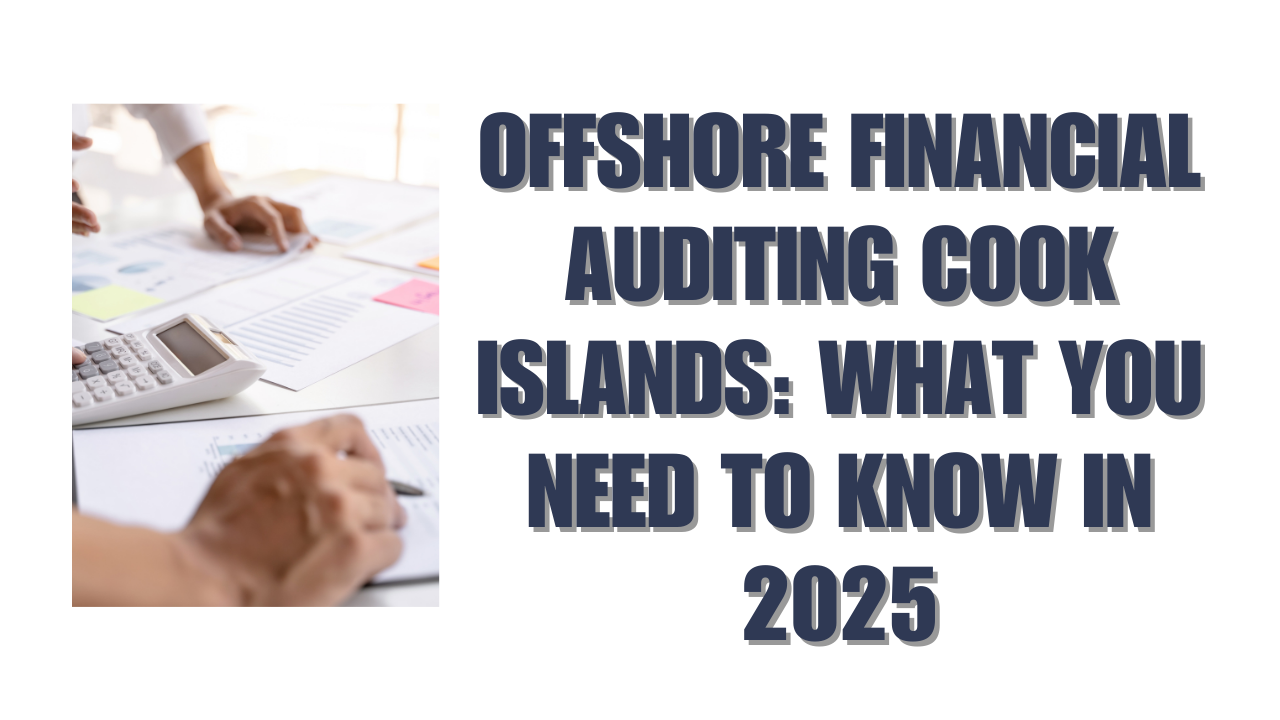Offshore financial auditing in the Cook Islands plays a critical role in maintaining trust, transparency, and legal compliance for international entities and trusts. Whether you’re managing an offshore company, involved in fiduciary services, or part of a trustee organization, understanding the auditing process is essential.
This article offers a complete guide to offshore financial auditing Cook Islands in 2025—explained in simple language and tailored to the local regulatory context.
What Is Offshore Financial Auditing?
Offshore financial auditing is an independent examination of financial records and statements of businesses or trusts that operate outside their home country—commonly through jurisdictions like the Cook Islands.
These audits ensure:
- Compliance with local and international laws
- Accurate and fair presentation of financial information
- Transparency to stakeholders and regulators
In the Cook Islands, offshore entities are often trusts, investment funds, or international companies using the jurisdiction for asset protection and privacy. Audits provide assurance that these structures are managed properly and meet financial reporting standards.
Why Offshore Financial Auditing Matters in the Cook Islands
The Cook Islands has built a strong reputation in offshore finance due to its robust legal framework, privacy laws, and asset protection mechanisms. However, with international scrutiny increasing, so is the importance of trustworthy auditing.
Here’s why it matters:
| Benefit | Explanation |
| Compliance | Audits help meet Cook Islands law, IRD requirements, and global standards like OECD and FATCA. |
| Reputation | Trusts and entities with clean audits attract better relationships with global banks and investors. |
| Risk Management | An audit can identify financial irregularities or weaknesses early. |
| Regulatory Readiness | Cook Islands authorities require offshore service providers to be prepared for audits or reviews. |
A well-documented and transparent audit trail protects entities from allegations of misuse, fraud, or tax evasion.
Offshore Entities That Require Auditing
Some offshore structures commonly audited in the Cook Islands include:
- International trusts
- Private trustee companies
- Offshore investment funds
- Foundations and estate planning structures
- International business companies (IBCs)
Although local law does not mandate annual audits for all entities, stakeholders such as investors, regulators, or parent companies often demand one. In recent years, increased emphasis on tax transparency and anti-money laundering (AML) standards has made auditing a best practice—even when not compulsory.
The Offshore Audit Process in the Cook Islands
Auditing an offshore entity in the Cook Islands follows international auditing standards (ISA), with some local adaptations. Here’s how the process typically works:
1. Engagement and Scope Agreement
The auditor and client agree on the terms of the audit. This includes understanding the structure (trust, IBC, fund), objectives, reporting deadlines, and compliance requirements.
2. Planning and Risk Assessment
Auditors review the business model, assess internal controls, and identify areas of financial or regulatory risk. For example, an offshore trust with multiple subsidiaries will require a more detailed review.
3. Evidence Gathering and Fieldwork
This involves examining financial records, confirming balances with banks, reviewing trustee decisions, and testing transaction accuracy. Cloud-based portals and virtual meetings are standard tools for this stage.
4. Review of Legal Compliance
Auditors ensure compliance with the International Trusts Act, Companies Act, AML/CFT Act, and relevant international agreements like the Common Reporting Standard (CRS).
5. Reporting and Recommendations
The auditor issues a report indicating whether the financial statements are accurate and whether there are any issues or risks. This may include recommendations for improving financial controls.
6. Submission and Filing
Reports are submitted to relevant parties, which may include trustees, beneficiaries, regulators, or financial institutions.
Key Compliance Considerations in 2025
In 2025, several compliance factors have gained prominence due to regulatory updates and global expectations.
| Area | Description |
| FATCA & CRS Reporting | Offshore entities must comply with tax exchange agreements and submit correct data. |
| Beneficial Ownership | Regulators demand clear records of who ultimately owns or benefits from an entity. |
| AML/CFT Procedures | Entities must maintain up-to-date KYC documentation and monitor for suspicious activity. |
| Substance Requirements | Some structures must demonstrate actual economic activity in the Cook Islands. |
Failure to comply can lead to fines, reputational damage, or loss of banking access.
Understanding the Role of Trustees and Auditors
In many Cook Islands offshore structures, trustees play a central role in holding and managing assets. The auditor’s job is to review how these fiduciary duties have been carried out and whether financial records accurately reflect all transactions.
Key responsibilities of trustees include:
- Maintaining detailed records of distributions and asset transfers
- Keeping minutes of trustee meetings and investment decisions
- Ensuring that funds are used in line with the trust deed
The auditor reviews these aspects to ensure legality and transparency. If a trust is involved in cross-border asset movement or complex holding structures, these elements must be documented and verifiable.
Choosing an Offshore Auditor in the Cook Islands
Choosing the right professional for offshore financial auditing Cook Islands is essential for compliance and peace of mind.
What to look for:
- Local Experience – Knowledge of Cook Islands legislation and trust structures
- Global Perspective – Familiarity with international reporting standards and tax regulations
- Independence – No financial stake in your business or trust activities
- Technology Capability – Use of secure digital audit platforms for offshore collaboration
It’s often better to work with a licensed accounting firm that specializes in offshore and trust audits. They can anticipate challenges and advise on how to strengthen your reporting framework.
Best Practices for Offshore Entities
To remain audit-ready and compliant, entities operating in the Cook Islands should:
- Keep accurate accounting records for all transactions
- Store important documents digitally and securely
- Hold regular trustee/director meetings and maintain resolutions
- Monitor changes in international compliance regulations
- Review and update internal AML/CFT procedures annually
Proactively preparing for audits not only saves time but also builds trust with investors and regulators.
Common Challenges in Offshore Auditing
Despite the advantages of operating in the Cook Islands, offshore entities may encounter the following challenges during audits:
| Challenge | Solution |
| Access to Records | Use secure cloud systems and encrypted sharing platforms |
| Multi-Jurisdiction Oversight | Clearly document intercompany transactions and related-party disclosures |
| Time Zone Delays | Plan meetings in advance and use asynchronous review tools |
| Understanding Local Law | Engage professionals familiar with Cook Islands-specific legal frameworks |
Being proactive with documentation and transparent operations helps overcome these hurdles efficiently.
Case Study: Offshore Trust Audit in Practice
Background:
A family trust based in Europe established an international trust in the Cook Islands to protect assets and ensure generational wealth transfer. The structure included a holding company and a private trustee company.
Audit Scope:
The audit covered:
- Financial statements for the past two years
- Trustee meeting minutes
- Investment performance reports
- KYC files and beneficiary communications
Findings:
The audit identified outdated KYC records for two beneficiaries and missing documentation for one overseas property transaction. Recommendations were provided to implement a document control system and conduct annual compliance training for the trustee team.
Outcome:
The trust successfully updated all documentation, conducted refresher training, and maintained its good standing with global tax and compliance authorities.
This example shows how a well-conducted audit can add value, even for non-operational trusts.
Offshore Financial Auditing Trends in 2025
Emerging trends for Cook Islands offshore audits include:
- Digital-first Audits: Remote audits are now standard using secure cloud tools
- AI Risk Analytics: Some firms are using AI to detect unusual patterns in offshore accounts
- Environmental, Social, and Governance (ESG) Reporting: Investors want to know how offshore funds align with ethical standards
- Enhanced Due Diligence: Regulatory bodies are requesting deeper documentation reviews and continuous monitoring
These trends show how offshore auditing is evolving to match global expectations and digital transformation.
Conclusion
Offshore financial auditing in the Cook Islands is no longer just a regulatory checkbox—it’s a strategic practice for asset protection, trust transparency, and global compliance.
Whether you’re managing an offshore trust, an investment fund, or an IBC, a well-executed audit provides:
- Legal and financial protection
- Assurance to beneficiaries and investors
- Alignment with evolving international regulations
In 2025 and beyond, offshore financial auditing Cook Islands is a smart step for anyone seeking to protect wealth and meet global standards.
FAQs
1. Is offshore financial auditing mandatory in the Cook Islands?
Not in all cases. While there is no blanket requirement for every offshore entity, many stakeholders—including investors, banks, and regulators—require audited financials. Some structures voluntarily opt for audits to enhance credibility and ensure regulatory compliance.
2. Who regulates offshore auditors in the Cook Islands?
Auditors are overseen by the Cook Islands Financial Supervisory Commission (FSC) and must follow International Standards on Auditing (ISA). Most offshore auditors are members of global accounting associations and adhere to strict quality control procedures.
3. Can offshore audits be done remotely?
Yes. Most Cook Islands offshore audits are done remotely using secure digital portals, video meetings, and encrypted document sharing. This flexibility ensures compliance without requiring in-person meetings or paper-based communication.
4. What documents should offshore entities keep ready for an audit?
Offshore entities should retain financial statements, bank statements, trustee resolutions, accounting records, KYC documentation, and any correspondence related to asset transfers or investments. Keeping digital versions of these documents improves audit efficiency.






